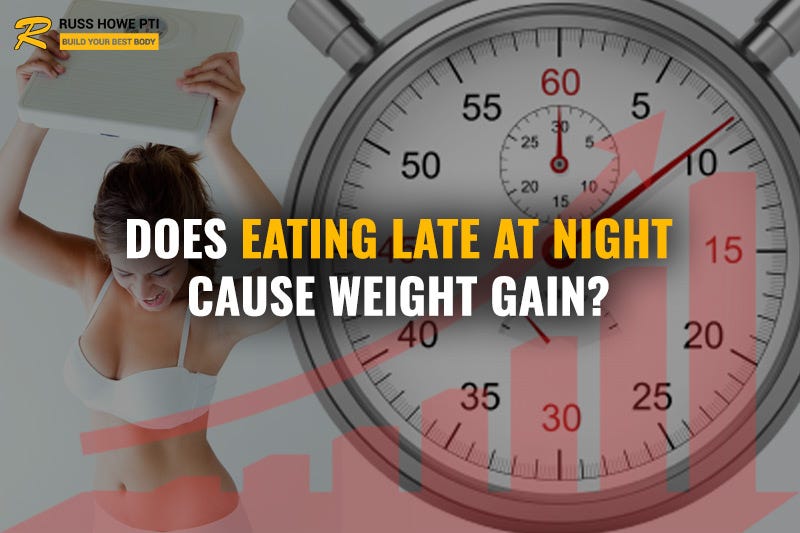Have you ever wondered if that midnight snack is secretly sabotaging your weight loss efforts? You’re not alone.
Many people struggle with late-night eating and wonder if it’s the reason their weight won’t budge. What if the timing of your meals matters just as much as what you eat? Understanding how eating late at night affects your body could change the way you approach your diet—and finally help you reach your goals.
Keep reading to discover the surprising truth about late-night eating and weight loss.
Impact Of Late-night Eating On Metabolism
Eating late at night can affect how your body works. Your metabolism changes during the day and night. This can influence weight loss efforts.
Understanding the impact of late-night eating helps you make better food choices. It also helps you plan meals for better health.
How Metabolism Changes At Night
Your metabolism slows down at night. The body uses less energy when resting or sleeping. This means fewer calories are burned compared to daytime.
Hormone levels that control hunger and digestion also change. These shifts can affect how your body processes food eaten late.
Effect On Calorie Burning
Calories eaten late are less likely to be burned. The body stores more energy as fat at night. This can slow down weight loss or cause weight gain.
- Late eating can reduce calorie burning by up to 10%
- Fat storage increases after late meals
- Daytime calories are used more efficiently

Link Between Night Eating And Weight Gain
Eating late at night can affect your body’s ability to lose weight. Many people wonder if late meals cause weight gain. Studies show that when and what you eat matters.
Night eating can change your metabolism and how your body stores fat. It may also affect hunger hormones, leading to overeating.
Studies On Late Eating And Body Weight
Research shows mixed results about eating late and weight gain. Some studies found that people who eat late tend to weigh more. Others say the total calories matter more than timing.
One study found that late eaters had higher body fat and a slower metabolism. Another study showed no difference in weight if calories were controlled.
- Eating late may reduce fat burning during sleep
- Late meals can increase hunger the next day
- Timing may affect hormones like insulin and leptin
Role Of Food Choices At Night
What you eat at night matters a lot. High-fat and sugary foods can add extra calories and cause weight gain. Healthy choices help the body manage weight better.
Eating protein and fiber-rich foods at night may keep you full longer. Avoid heavy or processed foods to reduce fat storage.
- Choose lean proteins like chicken or fish
- Eat vegetables and whole grains
- Limit sweets, fried foods, and snacks
- Drink water instead of sugary drinks
Hormones Influenced By Meal Timing
Eating late at night can change how your body controls important hormones. These hormones affect your weight and hunger.
Meal timing plays a key role in how these hormones work. Understanding this can help with weight loss efforts.
Insulin And Blood Sugar Levels
Insulin helps your body use sugar from food for energy. Eating late can make insulin work less well.
When insulin does not work well, blood sugar stays high. This can cause your body to store more fat.
- Late meals may raise blood sugar levels at night
- High blood sugar can lead to fat storage
- Proper meal timing helps insulin work better
Leptin, Ghrelin, And Appetite Control
Leptin and ghrelin are hormones that control hunger and fullness. Meal timing affects their levels.
Eating late can lower leptin, which tells you to stop eating. It can raise ghrelin, which makes you feel hungry.
- Leptin signals fullness to the brain
- Ghrelin increases hunger feelings
- Late eating may cause higher hunger at night
- Balanced meal timing supports better appetite control

Impact On Sleep And Weight Loss
Eating late at night can affect your sleep and weight loss efforts. The timing of your meals plays a role in how your body processes food and rests.
Understanding how late-night eating impacts sleep and metabolism helps you make better choices for health and weight management.
How Eating Late Disrupts Sleep
Eating close to bedtime can make it harder to fall asleep. Your body works to digest food instead of resting.
Heavy meals late at night may cause discomfort, acid reflux, or indigestion. These problems reduce sleep quality and duration.
- Increased stomach acid causes heartburn
- Full stomach delays sleep onset
- Body stays active digesting food
- Disrupted sleep cycles
Sleep Quality And Metabolic Health
Poor sleep quality affects how your body handles calories and fat. It can slow your metabolism and increase hunger.
When you sleep badly, your body produces more hunger hormones. This can lead to overeating and weight gain over time.
- Less deep sleep reduces fat burning
- Hormone imbalances increase appetite
- Slower metabolism causes weight gain
- Higher risk of insulin resistance
Tips For Healthy Late-night Eating
Eating late at night can affect your weight loss efforts. Choosing healthy options helps you avoid extra calories.
Smart choices and good habits support your goals. Learn how to eat late without harming your progress.
Choosing The Right Foods
Pick foods that are light and easy to digest. Avoid heavy, greasy, or sugary snacks late at night.
Good foods include fruits, vegetables, and lean protein. These keep you full without adding many calories.
- Fresh fruit like berries or an apple
- Vegetables like carrot sticks or cucumber
- Low-fat yogurt or cottage cheese
- A small handful of nuts or seeds
- Boiled eggs or grilled chicken slices
Portion Control And Timing
Keep your portions small to avoid extra calories. Eating too much late at night can slow weight loss.
Try to eat at least one to two hours before bed. This helps your body digest food better while you sleep.
- Use small plates or bowls for snacks
- Measure servings to avoid overeating
- Set a cut-off time for eating at night
- Drink water to reduce hunger
Individual Differences In Late-night Eating Effects
Eating late at night does not affect everyone the same way. Some people may gain weight, while others do not. This depends on many personal factors.
Understanding these differences helps explain why late-night eating impacts weight loss differently for each person.
Chronotypes And Eating Patterns
Chronotypes are a person’s natural sleep and wake times. Some are “morning people,” others are “night owls.”
Night owls tend to eat later and may feel more hungry at night. Morning people usually eat earlier in the day.
- Morning types often lose weight easier with early meals.
- Night owls might struggle with late eating but can still manage weight.
- Eating aligned with your chronotype can help with weight control.
Personal Metabolic Variations
Metabolism varies from person to person. Some burn calories faster, others slower.
People with faster metabolism may not gain weight from late meals. Those with slower metabolism might store more fat.
- Metabolic rate affects how your body uses late-night calories.
- Hormone levels also change how food is processed.
- Knowing your metabolism helps plan meal timing for weight loss.
Myths And Facts About Nighttime Eating
Many people wonder if eating late at night causes weight gain. There are many ideas about how nighttime eating affects the body. Some believe it is always bad for weight loss.
This topic has many myths and facts. Understanding the truth helps you make better food choices at night. Let’s look at common misconceptions and what science says.
Common Misconceptions
One common myth is that eating late at night automatically leads to weight gain. People think the body stores more fat from late meals. Others say skipping dinner helps lose weight faster.
Some also believe the body cannot digest food well at night. They think metabolism slows down so much that calories turn into fat more easily. These ideas create fear about eating after dinner.
- Eating late causes more fat storage.
- Skipping meals at night aids weight loss.
- Metabolism stops working well at night.
Evidence-based Insights
Research shows that weight gain depends on how many calories you eat, not just when you eat them. The body uses calories all day long. Eating late does not automatically cause fat gain.
Metabolism slows down slightly during sleep but still works. The total calories and food quality matter more than timing. Some studies find no difference in weight loss between early and late eaters.
- Weight depends on total calorie intake.
- Metabolism works even at night.
- Food choices matter more than meal timing.
- Eating late may affect sleep quality for some.
Eating large meals late can cause discomfort or poor sleep. Poor sleep might lead to weight problems. It is better to eat balanced meals and avoid heavy food just before bed.

Frequently Asked Questions
Does Eating Late At Night Cause Weight Gain?
Eating late can lead to weight gain if it increases total calorie intake. Metabolism slows at night, making calories more likely to store as fat. Avoid heavy meals close to bedtime to support weight loss efforts.
How Does Late-night Eating Affect Metabolism?
Late-night eating may disrupt your natural metabolism rhythm. Your body burns fewer calories during sleep, so excess calories can convert to fat. Eating earlier supports better metabolic function and weight management.
Can Late-night Snacks Hinder Weight Loss Progress?
Yes, late-night snacks often add extra calories and unhealthy choices. This can slow weight loss or cause weight gain. Opt for light, healthy snacks if needed, and avoid overeating before bed.
Is It Better To Skip Dinner For Weight Loss?
Skipping dinner isn’t recommended as it may cause overeating later. Balanced meals at regular times help regulate hunger and metabolism. Focus on portion control and nutrient-rich foods instead.
Conclusion
Eating late can affect weight loss efforts. Timing of meals matters. Nighttime eating may lead to extra calorie intake. This can hinder weight loss goals. Choosing healthier snacks helps maintain progress. Opt for fruits or nuts instead of junk food.
Sleep quality also plays a role. Poor sleep can impact hunger hormones. Maintain a balanced routine for better results. Plan meals thoughtfully throughout the day. Small changes make a difference. Listen to your body’s signals. Consistency is key. Stay mindful of eating habits.
Achieving weight loss requires patience and dedication. Small steps lead to lasting success.



